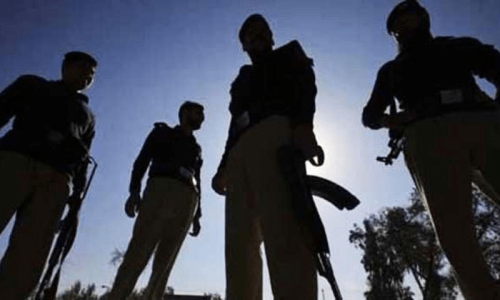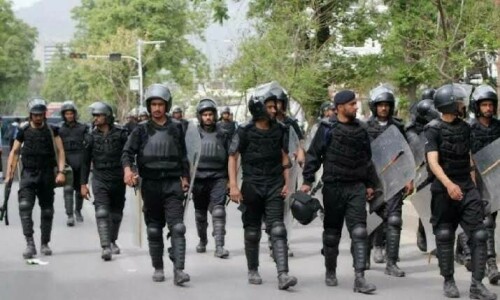ISLAMABAD, April 21: The Supreme Court on Monday scrapped the graduation condition for legislators imposed by President Pervez Musharraf in 2002, declaring it a negation of fundamental rights as enshrined in the Constitution.
“For reasons to be recorded later, this petition under Article 184(3) of the Constitution of the Islamic Republic of Pakistan, 1973, is allowed. The provisions of Article 8(A) of the Conduct of General Election Order, 2002 (Chief Executive’s Order No 7 of 2002) and clause (cc) of subsection (1) of section 99 of the Representation of the People Act (RPA) 1976, are declared to be void prospectively on account of their being inconsistent with articles 17 (freedom of association) and 25 (equality of citizen) of the Constitution,” said a short order announced by a seven-member bench of the Supreme Court, accepting a joint petition filed by JUI-F members Mohammad Nasir Mehmood and Shameer Ahmed, after two days of hearing.
Chief Justice Abdul Hameed Dogar headed the bench which included Justice Faqir Mohammad Khokhar, Justice Ijazul Hassan, Justice Mohammad Moosa K. Leghari, Justice Chaudhry Ejaz Yousaf, Justice Syed Sakhi Hussain Bukhari and Justice Syed Zawwar Hussain Jaffery.
In July 11, 2002, a five-member bench of the Supreme Court had upheld the graduation condition for legislators on a petition moved by the PML-Q.
In 2002, through Article 8(A) of the Chief Executive Order No 17, Section 99 (1)(CC) was inserted into the Representation of Peoples Act 1976, requiring a contesting candidate to be at least a graduate in any discipline or holder of a degree recognised by the Higher Education Commission.
“I will file a review against the order,” Dr Aslam Khaki, an Islamic jurist, who through an application had supported the graduation condition, told Dawn.
“I still believe that the law on the condition of graduation is protected under the Constitution and, therefore, this court has no jurisdiction to examine its validity,” he said, adding that by making the order prospective, great discrimination had been made to those who could not participate in 2008 elections because of this condition.
MMA Senator Kamran Murtaza who represented the petitioners termed the apex court’s verdict a good decision. “It has struck down an incorrect law introduced to benefit only one per cent of the total population of 160 million people,” he added.
Attorney General Malik Mohammad Qayyum described the graduation condition as a “one-man law” made in negation of democracy and political justice. “If someone has a bachelor degree, does it mean that he is also well versed with the legislation process,” he asked.
He said that the law had been examined earlier without going into its reasonableness and added that through this an elitist democracy had been created to establish a class in society. “Can only three per cent of the total registered voters (68.1 million) be allowed to govern the country,” he asked.
Advocate Raja Niaz Rathore, counsel for the federal government, requested the court to strike down the graduation condition for being a “bad law”.
Dr Aslam Khaki argued before the bench that acceptance of the instant petition would mean that the elected national and provincial assemblies would stand dissolved, requiring a fresh election to give right to all those who could not file their nomination papers because of the bar.
By striking a protected law, he said, the building structure of judgment of this court of validating the Nov 3 emergency would also be pulled down.
“With the blessings of the attorney general, the petitioners want to drag this court into the domain of the legislature,” he said and warned that the deposed judges were sacked on the allegation of interfering and encroaching upon the functions of other organs of the state, like the legislature and the executive.
Referring to the 2002 verdict, he said, no fresh petition on the same point could be filed; only a review petition was competent.
Senator Murtaza said the graduation condition was the most abused law as forged degrees were being used in the elections. Despite being a graduate assembly, the previous assembly had failed to install a single power house and was also responsible for wheat and sugar crises, he said.











































Dear visitor, the comments section is undergoing an overhaul and will return soon.